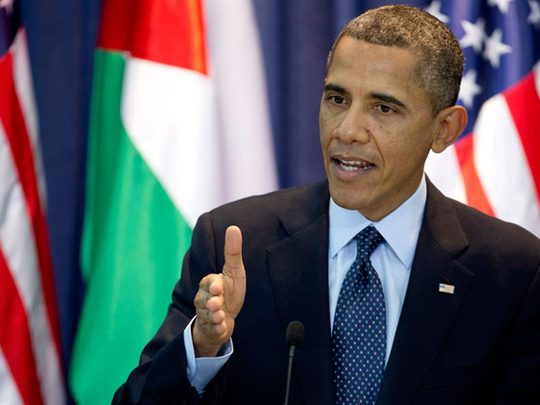
There is no doubt that the two public remarks that US President Barack Obama had before young Israelis and Palestinians on the same day, but at two different locations — occupied Jerusalem and Ramallah — last week were “memorable” for the new positions he expressed and the ones he avoided repeating or highlighting. A lonely heckler’s comment in occupied Jerusalem, in the midst of a large young Israeli audience — which seemingly included some Arabs, estimated at some 2,000 — was hardly intelligible on international television, but the president dismissed the interruption comically, a reaction which was applauded loudly.
For example, the president never repeated a remark he made several years ago that occupied Jerusalem must never be divided. On the other hand, he did not ask Israel to halt construction of colonies as he had done previously, but he used the word “occupation” — a term hardly used by American officials and the media in describing the growing Israeli presence within West Bank colonies, now estimated at half a million. He urged his young, enthusiastic Israeli audience to empathise with their Palestinian neighbours living under occupation. He declared: “Put yourself in their shoes — look at the world through their eyes ... It is not fair that a Palestinian child cannot grow up in a state of her own and lives with the presence of a foreign army that controls the movements of her parents, every single day.”
In other words, he added, if Israeli colonies continue expanding, it will be “very difficult to square with a two-state solution”. It was apparent that Obama had wished to avoid on his first visit as president to Israel, the Occupied Territories and Jordan to see the infamous Israel wall that divides Israel from the West Bank. His scheduled choice was to travel aboard his helicopter to visit the Church of Nativity, where Jesus is believed to have been born in Bethlehem — a step that irked Palestinians. However, thanks to the grace of God, as one Palestinian put it, a rare sandstorm hit the region, compelling Obama to travel by car, passing through the obnoxious wall which is 760km long.
One would have expected Obama to follow the footsteps of president Ronald Reagan, who had challenged Soviet leader, Mikhail Gorbachev, during a visit to the Brandenburg Gate near the Berlin Wall on June 12, 1987, when he famously declared “tear down the Wall”. The wall was demolished two years later. Even if Obama would not care to imitate a Republican president, he could have, as long as he was in the Holy Land, copy what Yusha Bin Nun, the prophet, did in nearby Jericho where, with the help of priests who had made “a long blast with a ram’s horn” that prompted the locked residents of Jericho to “shout with a great shout, and the wall of the city fell down flat ...”
The visit of the American president was lacklustre, except for his greatest achievement, namely the surprise Turkish-Israeli reconciliation. What Benjamin Netanyahu, the Israeli Prime Minister, may discover is that his Turkish counterpart is very much unlike the one he knew before their fallout over the Israeli attack on the Turkish flotilla that was heading to the besieged Gaza Strip. Turkish Prime Minister Recep Tayyip Erdogan, who had insisted in the terms of the reconciliation that Israel would end its embargo against Gaza, will also be visiting the Palestinian President, Mahmoud Abbas in Ramallah and both are said to be planning a trip to Gaza.
Whether the upcoming visit to Gaza and the recent talks that US Secretary of State, John Kerry, had in the region at the end of Obama’s Mideast tour will yield any serious negotiations is too early to tell. The stumbling block that remains is Israel’s refusal to halt its expansionist schemes in the Occupied Territories and the failure of reconciliation between Abbas’s Fatah and Hamas, now led by Khalid Mesha’al.
The only hope remains with Obama, who has seemingly improved his relationship with the Israeli leadership.
In the meantime, he ought to resurrect some even-handedness, once the favoured policy line of past American administrations, a line that Secretary Kerry seems capable of undertaking as he recently demonstrated in Afghanistan. Israel, in turn, cannot afford to remain isolated much longer in the Middle East.
George S.Hishmeh is a Washington-based columnist. He can be contacted at ghishmeh@gulfnews.com








